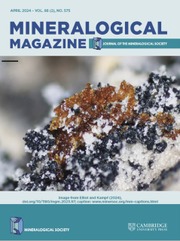Crossref Citations
This article has been cited by the following publications. This list is generated based on data provided by Crossref.
Farnan, I.
and
Dove, M. T.
2000.
Structure and dynamics of silicate glasses and melts.
Mineralogical Magazine,
Vol. 64,
Issue. 3,
p.
373.
Trachenko, Kostya O
Dove, Martin T
Harris, Mark J
and
Heine, Volker
2000.
Dynamics of silica glass: two-level tunnelling states and low-energy floppy modes.
Journal of Physics: Condensed Matter,
Vol. 12,
Issue. 37,
p.
8041.
Tucker, M. G.
Keen, D. A.
and
Dove, M. T.
2001.
A detailed structural characterization of quartz on heating through the α–β phase transition.
Mineralogical Magazine,
Vol. 65,
Issue. 4,
p.
489.
Palin, Erika J
Trachenko, Kostya O
and
Dove, Martin T
2002.
Computer simulation study of low-energy excitations of silicate glasses.
Journal of Physics: Condensed Matter,
Vol. 14,
Issue. 19,
p.
4857.
Barrera, G D
Bruno, J A O
Barron, T H K
and
Allan, N L
2005.
Negative thermal expansion.
Journal of Physics: Condensed Matter,
Vol. 17,
Issue. 4,
p.
R217.
Ren, Suxia
Guo, Yupeng
Zhao, Lina
Ma, Xiaokun
Xiao, Yupeng
Yu, Yang
Liu, Ying
Zhao, Xu
and
Wang, Zichen
2008.
The preparation of tridymite crystal by chemical processing.
Phase Transitions,
Vol. 81,
Issue. 5,
p.
395.
Douglas, G. W.
Schnabel, S.
Kjerengtroen, L.
Cross, W. M.
and
Kellar, J. J.
2010.
Utilizing minerals and materials with negative properties.
Mining, Metallurgy & Exploration,
Vol. 27,
Issue. 1,
p.
1.
Lind, Cora
Coleman, Maria R.
Kozy, Leah C.
and
Sharma, Gayathri R.
2011.
Zirconium tungstate/polymer nanocomposites: Challenges and opportunities.
physica status solidi (b),
Vol. 248,
Issue. 1,
p.
123.
Lind, Cora
2012.
Two Decades of Negative Thermal Expansion Research: Where Do We Stand?.
Materials,
Vol. 5,
Issue. 6,
p.
1125.
Berlie, Adam
Kearley, Gordon J.
Liu, Yun
Yu, Dehong
Mole, Richard A.
Ling, Chris D.
and
Withers, Ray L.
2015.
Energy and temperature dependence of rigid unit modes in AlPO4-5.
Physical Chemistry Chemical Physics,
Vol. 17,
Issue. 33,
p.
21547.
Schliesser, Jacob M
and
Woodfield, Brian F
2015.
Development of a Debye heat capacity model for vibrational modes with a gap in the density of states.
Journal of Physics: Condensed Matter,
Vol. 27,
Issue. 28,
p.
285402.
Kovács Kis, Viktoria
Czigány, Zsolt
and
Németh, Tibor
2017.
Nanostructural investigation of slightly altered rhyolitic volcanic glass.
Materials Characterization,
Vol. 127,
Issue. ,
p.
121.
Shi, Ying
Ma, Dong
Song, Albert P.
Wheaton, Bryan
Bauchy, Mathieu
and
Elliott, Stephen R.
2020.
Structural evolution of fused silica below the glass-transition temperature revealed by in-situ neutron total scattering.
Journal of Non-Crystalline Solids,
Vol. 528,
Issue. ,
p.
119760.
Shi, Ying
Tandia, Adama
Deng, Binghui
Elliott, Stephen R.
and
Bauchy, Mathieu
2020.
Revisiting the Makishima–Mackenzie model for predicting the young's modulus of oxide glasses.
Acta Materialia,
Vol. 195,
Issue. ,
p.
252.
Micoulaut, Matthieu
Flores-Ruiz, Hugo
Pradel, Annie
and
Piarristeguy, Andrea
2021.
Tetrahedral Complexity in Amorphous Networks: A Possible Clue for the Unique Properties of Phase‐Change Materials.
physica status solidi (RRL) – Rapid Research Letters,
Vol. 15,
Issue. 3,
Grima-Cornish, James N.
Attard, Daphne
Grima, Joseph N.
and
Evans, Kenneth E.
2022.
Auxetic Behavior and Other Negative Thermomechanical Properties from Rotating Rigid Units.
physica status solidi (RRL) – Rapid Research Letters,
Vol. 16,
Issue. 2,
Shi, Ying
Deng, Binghui
Neuefeind, Jörg
Zhou, Qi
Smedskjaer, Morten M.
Elliott, Stephen R.
and
Bauchy, Mathieu
2023.
Revealing the effect of medium-range structure on silicate glass hardness.
Physical Review Materials,
Vol. 7,
Issue. 1,
Shi, Ying
Fu, Qiang
Spier, Charisse
Vu, Myra
Xie, Wenqing
and
Du, Jincheng
2023.
Revealing structural role of ZrO2 in silicate glasses from macroscale property by rigid‐unit packing fraction method.
Journal of the American Ceramic Society,
Vol. 106,
Issue. 3,
p.
1795.
Tan, Lei
Heine, Volker
Li, Gong
and
Dove, Martin T
2024.
The rigid unit mode model: review of ideas and applications.
Reports on Progress in Physics,
Vol. 87,
Issue. 12,
p.
126501.

